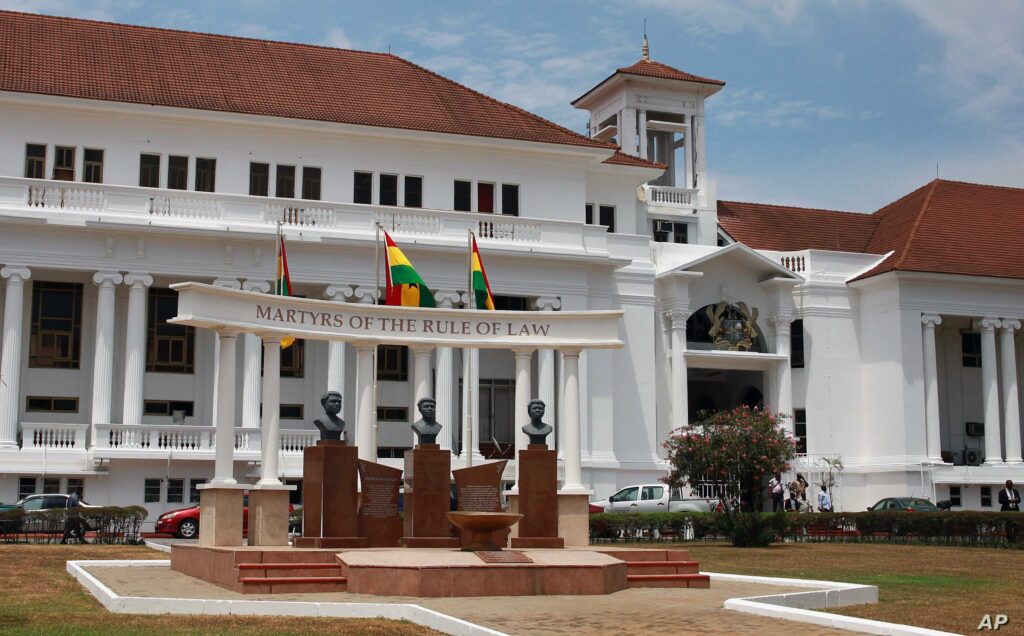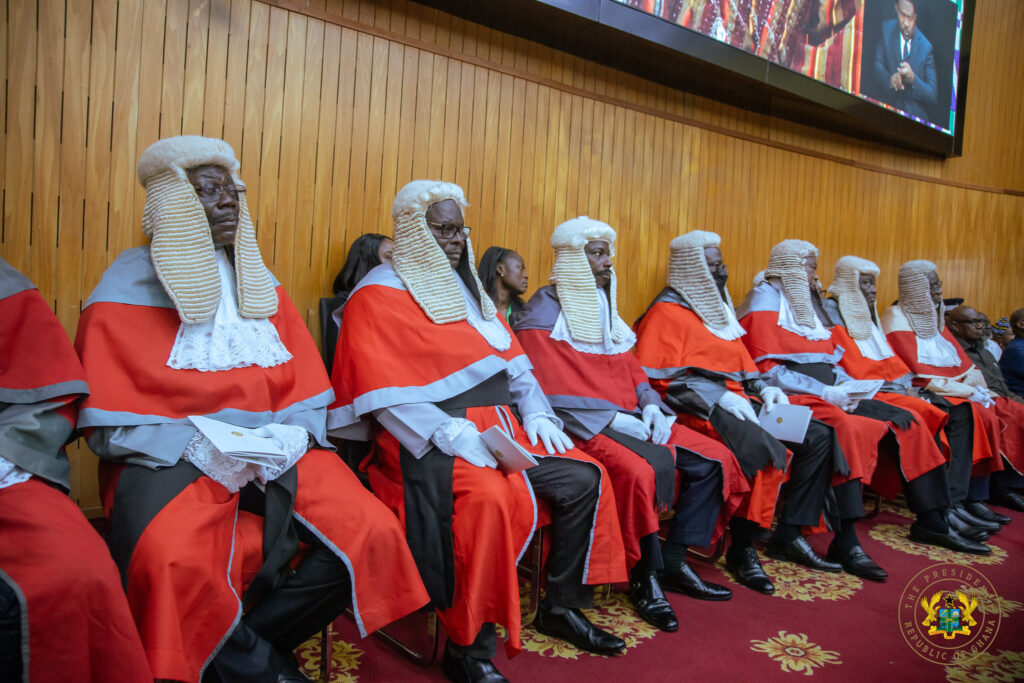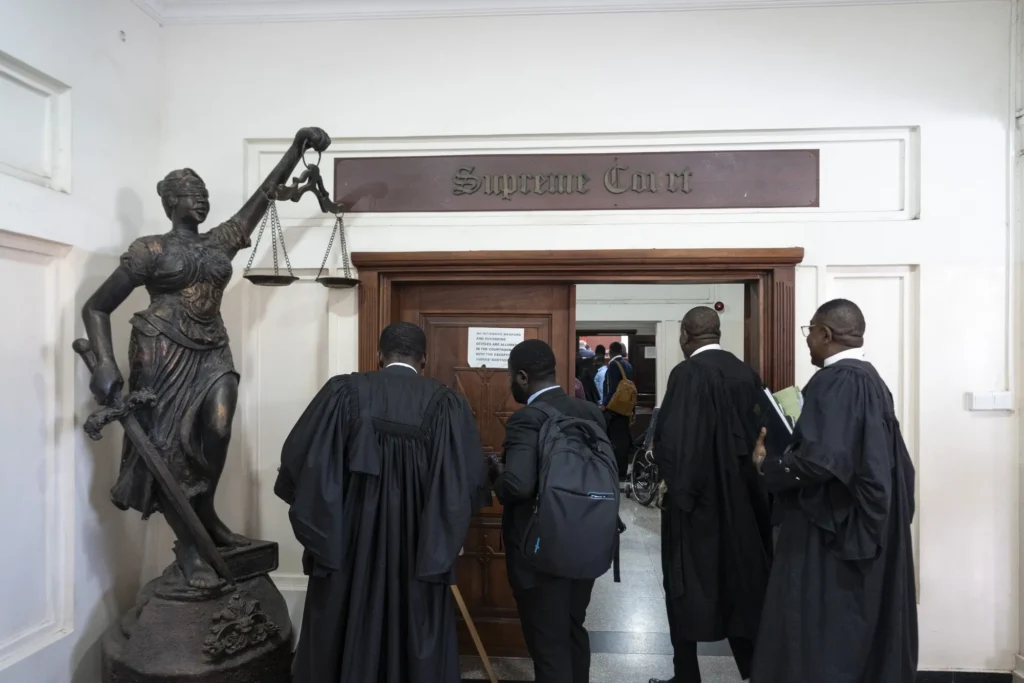The former (now estranged) Chief Justice of Ghana, Gertrude Torkornoo, has sued the President of Ghana before the ECOWAS Community Court of Justice.
She is challenging her dismissal and the ill treatment she alleges the government meted out to her following her dismissal from office after a set of petitions were made against her.
According to a statement by Ghana’s Attorney General and Minister of Justice, Justice Seyram Sai, the Chief Justice is suing to declare her dismissal unconstitutional.
This similar suit was recently unanimously dismissed by Ghana’s Supreme Court.
The former Chief Justice also repeats allegations of human rights violations in her ongoing dismissal, which she already cited during her public statement on June 25, 2025.
Despite its position as a shining beacon of democracy in West Africa, Ghana continues to face significant challenges in its constitution and rule of law.
Several calls for reforms or a new constitution have been made over the years, following the recognition that the 1992 constitution has many faults and contradictions.
A key contradiction in Ghana’s 1992 Constitution lies in its core mandate to ensure the separation of powers, particularly between the judiciary and the executive, while granting the President significant authority to appoint and dismiss Supreme Court judges, thereby centralizing judicial power.
The President can also appoint members to the executive and supreme court councils in charge of ensuring judicial independence.
Judicial Independence
The debate on how Supreme Court judges are appointed, and if that process ensures judicial independence, has long been a subject of interest by scholars, policymakers, and the public.

The judiciary, as an arm of government, remains not only as one of the most important backbones on which every state’s democracy is built, but also as an institution where the judiciary functions to maintain social order and a reasonable sense of security for people to pursue their needs.
This second function is maintained through administering the law in a fair and equal manner, following fair procedures, and the main principles of justice.
It remains the responsibility of the judiciary, and especially a neutral Supreme Court, which is often the final place for arbitration, to ensure that individuals, corporations, and corrupt governments do not abuse these freedoms and disrupt social order.
This also means that the principles of justice make it a prerogative that freedoms, rights, and responsibilities of citizens, corporations, and every other entity, as well as any breaches of these rights and responsibilities, can be objectively determined.
The absolute independence of the judiciary should hence be of absolute importance to this objective determination.
Scholar of Judicial Activism at the University of Miami, Prof OM Fiis explains judicial independence as the absolute freedom of the judiciary from any form of interference, including both direct and indirect.
Directly through means such as bribery, exertion of the powers of a superior authority, among others.
Indirectly, interference may involve any activity that may lead to or give an impression that influence has been exerted on a decision that the judiciary made.
This explanation is significant in part because of how wealthy individuals, corporations, and other arms of government may try to indirectly influence decision-making through various means.
That is, it becomes important that the judicial system is insulated and protected to exercise its power without interference.
“The ongoing case at the ECOWAS Community Court of Justice concerning the suspension of Ghana’s Chief Justice Gertrude Torkornoo presents a critical examination of the constitutional safeguards intended to uphold judicial independence under Ghana’s 1992 Constitution.”
Ghana’s Supreme Court Today – Appointments
Clause 1 of Article 127 of the 1992 Constitution guarantees judicial independence, stating that the Judiciary shall not be subject to the control or direction of any person or authority in the exercise of judicial power in terms of judicial function, administrative responsibilities, and financial administration.
Clause 2 of Article 127 further states that “neither the President nor the Parliament nor any person whatsoever shall interfere with judges and judicial officers or other persons exercising judicial power, in the exercise of their judicial functions, and that all state organs must accord the courts such assistance as they may reasonably require to protect their independence, dignity and effectiveness.”
Despite these clauses guaranteeing judicial freedom, the constitution today, just like its contemporaries in the past, gives the President a substantial authority to influence Supreme Court decision-making.

Article 144 of Ghana’s Constitution stipulates: The Chief Justice is appointed by the President in consultation with the Council of State and with the majority approval of Parliament.
The President appoints other Supreme Court justices based on the advice of the Judicial Council, also in consultation with the Council of State and with Parliamentary approval.
Judges of the Court of Appeal, High Court, and regional tribunals are appointed by the President upon the Judicial Council’s advice.
This process highlights the President of Ghana as the pivotal figure in judicial appointments.
The President also has a significant role in forming the Council of State, an advisory body consulted in the Chief Justice’s appointment.
The appointment of the 25 Council members and the nature of the consultation are not well-defined within the constitution.
Additionally, Parliamentary approval of judicial appointments requires only a simple majority, typically a straightforward hurdle.
Similarly, the Ghanaian Judicial Council does not seem to play a significant role in the judicial appointments process beyond offering unspecified advice to the President.
In the appointment of the Chief Justice, the Council has no role at all.
In addition to the procedures for appointing judges and the Chief Justice, another controversial aspect of the Supreme Court appointments is the lack of an upper limit on the number of justices that can be appointed to the Court.
Article 128(1) of the 1992 Constitution states that the “Supreme Court shall consist of the Chief Justice and not less than nine other Justices of the Supreme Court.”
This open-ended provision allows the government to potentially increase the number of justices, raising concerns about court-packing with justices who may favor the government’s stance on critical issues.

A notable example of this occurred with the appointment of Justice Afreh to the Supreme Court in March 2002.
His appointment came just before the court reviewed the Tsatsu Tsikata v. Attorney General case, which challenged the constitutionality of ‘fast track’ courts.
Justice Afreh’s inclusion increased the number of justices, and when the case was reviewed, the previous decision was overturned in favor of the state.
This instance underscores the implications of the constitutional ambiguity regarding the number of Supreme Court justices and the potential for executive influence over the judiciary.
Another key issue underscoring the urgent need for judicial independence is the Chief Justice’s power to determine which justices are assigned to specific cases.
The Ghanaian Constitution provides no specific guidance on this matter, leaving the selection process undefined. This lack of clarity opens the door to potential manipulation, particularly if the Chief Justice owes their appointment to the executive.
In such scenarios, there is a risk that the Chief Justice might choose judges who could be swayed by political interests, thereby compromising the judiciary’s integrity.
Moreover, the executive branch’s power to dismiss the Chief Justice and justices of the superior courts without a robust oversight mechanism exacerbates this vulnerability.
Under Article 146 of the 1992 Constitution, the President, upon receiving a petition for the removal of a superior court justice or the chair of a regional tribunal, must refer the petition to the Chief Justice.
If a prima facie case is established, a committee is formed by the Chief Justice and the Judicial Council to investigate and recommend actions to the President, who is then obliged to follow these recommendations.
While this process ostensibly limits the executive’s role in judicial removals, the influence the executive holds over the appointment of the Chief Justice and Judicial Council members can seem to undermine judicial independence.
The threat of dismissal looms large, potentially swaying judicial decisions to align with executive preferences.
This issue is even more pronounced for the Chief Justice, as the President, in consultation with the Council of State, appoints a committee to address petitions against the Chief Justice.
The Constitution does not explicitly require a prima facie case for initiating the removal process for the Chief Justice, making it easier for a President to oust a non-compliant Chief Justice.
These provisions in the 1992 Constitution grant the executive and legislative branches disproportionate power over the judiciary, threatening its independence.
“Ultimately, this case illustrates how the expansive powers entrusted to the executive in judicial appointments and removals, coupled with ambiguous constitutional language and procedural gaps, imperil the judiciary’s integrity.”
Justice Gertrude Torkornor’s Dismissal and Ghana’s Constitution
The ongoing case at the ECOWAS Community Court of Justice concerning the suspension of Ghana’s Chief Justice Gertrude Torkornoo presents a critical examination of the constitutional safeguards intended to uphold judicial independence under Ghana’s 1992 Constitution.
The Chief Justice is currently challenging the legality and constitutionality of this suspension before the ECOWAS.

She has alleged violations of her constitutional rights, including her right to dignity, fair hearing, and due process as enshrined in the African Charter on Human and Peoples Rights.
She is also seeking damages of about $10 million for moral and reputational damages.
In a landmark case of E.K Sallah v Attorney General, the National Liberation Council (NLC) transitional government refused to comply with Supreme Court orders to reinstate E.K Sallah, a public worker unfairly sacked by Prime Minister Abrefa Busia in February 1970.
This case, including the brutal murder of judges in 1982, controversial appointments, and the current historic dismissal of a Chief Justice, has emerged as a worrying trend of significant executive overreach into the judiciary, an action that significantly threatens the shining democracy Ghana is claimed to be.
The current case unfolding is a stark reminder of the imperfection of the 1992 constitution.
While simultaneously stipulating and guaranteeing its independence from any form of interference, it gives the executive extensive powers over judicial appointments and removals.
In addition, it also allows the appointment of key members of the Council of State – an advisory body integral to overseeing this process.
While the suspension of Chief Justice Torkornoo was decided by local courts to have adhered, in form, to the procedures laid out in Article 146, it prescribes the referral of petitions to the Chief Justice or an appointed delegate, the establishment of a committee of inquiry upon prima facie findings, and the President’s ultimate decision based on the committee’s recommendation.
Nevertheless, in practice, the constitutional process lacked genuine impartiality and transparency.
The petitions submitted to the President for her removal were not disclosed to her or the public, despite her suspension until public calls and demands were made.
The absence of clear procedural guidelines or an independent body governing appointments, suspensions, and removals has opened avenues for abuse.

Both of Chief Justice Torkornoo’s claims that she was suspended before any final determination or meaningful opportunity to defend herself, and the dismissal of her domestic legal challenges on procedural grounds.
Her current case at the ECOWAS Court underscores due process deficiencies in the 1992 constitution, casting doubt on the fairness and independence of the administration of justice not only in this case but on the constitution itself.
This unprecedented confrontation places judicial independence under intense scrutiny and reveals the delicate balance, or arguably, imbalance between ideological constitutional guarantees and practically how much executive authority is wielded over the judiciary.
It exposes systemic weaknesses that risk eroding an already low public confidence in the judiciary’s impartiality.
It also serves as a stark reminder that constitutional provisions, while robust in theory, require strengthening in practice through clearer, more transparent procedures and stronger institutional safeguards to effectively shield the judiciary from political interference.
The intervention of the ECOWAS Court at this juncture signals a growing need for regional oversight when domestic remedies appear inadequate, highlighting challenges to judicial sovereignty that have far-reaching significance.
Ultimately, this case illustrates how the expansive powers entrusted to the executive in judicial appointments and removals, coupled with ambiguous constitutional language and procedural gaps, imperil the judiciary’s integrity.
It underscores the urgent necessity for constitutional reforms to secure judicial independence in Ghana both in letter and in spirit, fostering a judiciary capable of administering justice free from political coercion and aligned with democratic principles, for all.





